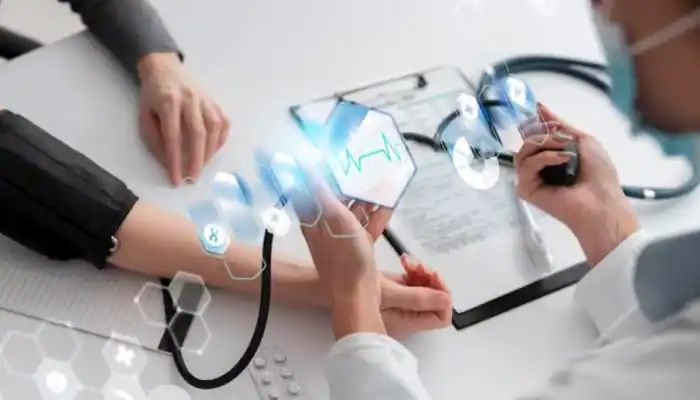
What Is Digital Health? Here's How Technology Is Empowering
Doctors And Healthcare
Despite all of the technological advances in healthcare,
doctors are still an essential element of modern civilization especially post
Covid-19 which resulted in millions of deaths worldwide and devoid the world of
in-patient and OPD treatments.
Technology has a profound impact on every sector. Global
awareness has been captivated by the remarkable technological progress in
providing digital healthcare in the past few years especially due to the
pandemic.
The healthcare system's nervous system is now digitalization.
It involves expediting the recognition and eradication of substantial
inequalities in local, regional, international, and personal healthcare.
What is Digital Healthcare?
Digital health, often known as digital healthcare, is a
wide, interdisciplinary term that encompasses ideas from the point where
technology and healthcare converge. By combining software, hardware, and
services, digital health brings digital transformation to the healthcare
industry.
The World Health Organization (WHO) recognised digital
health as a means to achieve global health and well-being, in line with the
Sustainable Development Goal (SDG 2030).
Dr Kanury V S Rao, Co-Founder & Chief Scientific
Officer (CSO), PredOmix says, ?We are witnessing a rapid technology
revolution in healthcare, empowering doctors with advanced tools and
data-driven insights. These advancements have undoubtedly improved diagnostic
accuracy, treatment planning, and patient outcomes. Technology is enabling
doctors to offer better treatments and enhance patient experiences, from the
broad use of electronic health records for seamless data management to
artificial intelligence-driven diagnostics and telemedicine services."
"For instance, in cancer, new technologies are
empowering doctors with state-of-the-art diagnostic modalities such as advanced
imaging systems, AI-driven algorithms for early disease detection, and
precision medicine tools such as genomics for personalized treatment plans. It
is crucial to emphasize that amidst these remarkable progressions, the doctor's
touch of empathy remains irreplaceable in patient care. While advancements
enhance medical capabilities, genuine human compassion ensures a
patient-centred approach, creating a harmonious balance between technology and
care?.
According to the World Health Organisation, the phrase
"digital health" refers to eHealth that makes use of cutting-edge
computer sciences including big data, blockchain, genomics, artificial
intelligence (AI), virtual reality (VR), genomics, and business analytics.
Doctors may more easily manage their time and focus on
providing professional and individualised patient care instead of handling
administrative tasks when they achieve digital transformation. Furthermore,
diagnostic accuracy is increased with access to analytics and digital health
information.
Dr Rubeena Zainab, consultant, obstetrician and
gynaecologist, at Milann Fertility and Birthing Hospital adds
further, ?Technology is transforming healthcare, empowering doctors
and revolutionizing patient care. Electronic Health Records (EHRs) enable
seamless communication among healthcare providers, reducing errors and
improving patient outcomes.
Telemedicine has emerged as a game-changer, enhancing
access to healthcare, especially during global health challenges. AI and ML
analyze vast data, leading to more accurate diagnoses and personalized
treatment plans."
"The healthcare industry has seen a significant
transition in recent years as a result of fast technological improvements. From
telemedicine and artificial intelligence to electronic health records and
precision medicine, technology has significantly altered how we care for
patients," Ayush Atul Mishra CEO and Co-founder, of Tattvan E-Clinics
comments.
"These discoveries have not only made healthcare more
accessible but have also changed the way we detect illnesses, treat patients
and ultimately improve their overall well-being. Telemedicine has quickly
emerged as a transformational force in the healthcare business, transforming
the way people get medical care. With new technology and the demand for
accessible and convenient healthcare, hospitals and healthcare firms are
embracing telemedicine to address difficulties and improve patient
experiences," says Mr Ayush Atul.
Digitalization of all healthcare services has made it
possible to fetch, store and analyze high-quality patient data and
Mr Abhinav Sharma- Co-Founder, TaCa Healthcare strengthens this point by
adding, "Gone are the days of relying solely on intuition and experience;
today & doctors harness the vast potential of data analytics and machine
learning to make informed decisions swiftly and accurately. The fusion of human
expertise and technological prowess not only enhances patient outcomes but also
improves the overall healthcare experience. As the digital health landscape
continues to evolve, we stand witness to a future where doctors become
unstoppable champions of health, fortified by the synergy of compassion and
innovation."
In summary, Dr Rubeena Zainab says, "Wearable
devices and health apps empower patients to monitor their health in real-time,
taking proactive steps towards better well-being. Robotics offer precision in
minimally invasive surgeries, reducing discomfort and hospital stays."
In conclusion, technology propels medicine forward, delivering better, personalized care. A brighter, patient-centred healthcare future awaits as we continue to embrace innovation responsibly.?
We use cookies and IP addresses to improve site performance and understand user interests. This data does not personally identify you unless you voluntarily provide information. Third-party advertisers may also use cookies.
OKPrivacy Policy